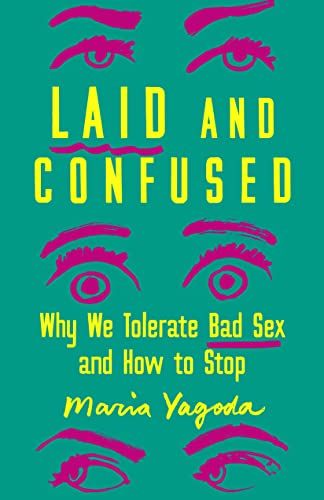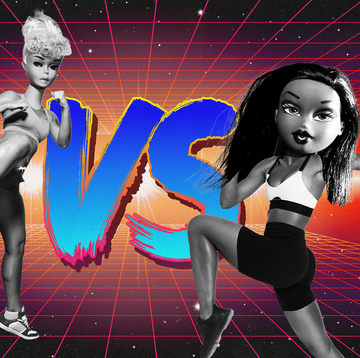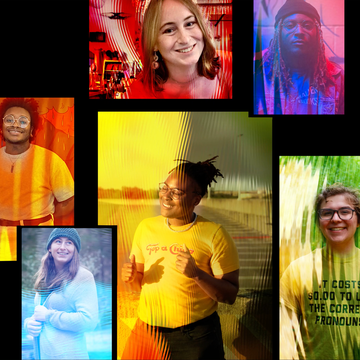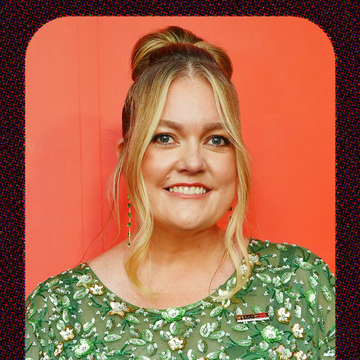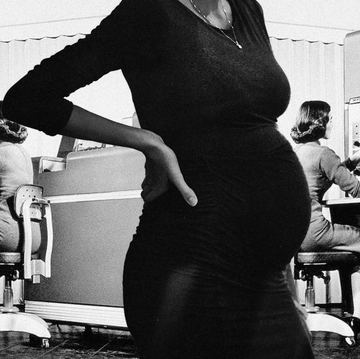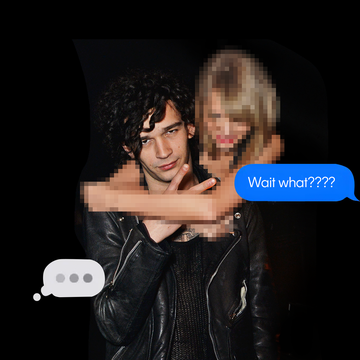In January 2022, a few months after joining TikTok in a last-ditch bid at youth, I posted a video that reckoned with another pandemic winter. “If ur in a dry spell,” I wrote, “this is your reminder that being a temporarily celibate recluse is actually quite elite. Not having sex with people who suck frees up more time for drinking seltzer, luxuriating in pajamas, and staring into the void. It doesn’t make you any less of a sluht.”
The TikTok racked up hundreds of thousands of views. Not only did I feel like my generation’s Addison Rae, but the video’s comments validated reporting I had been doing for a year: There was indeed a large, growing community of people who fully embraced their sexuality, but who were opting out of sex. “I love being single and not talking to anyone,” one woman responded to my TikTok. The commenters were overwhelmingly in agreement and solidarity. I was particularly moved to see someone write, “Celibate $luts unite!”
Throughout the last two years, in which I (mostly) loved being single and not talking to anyone, I saw more and more content that subverted the concept of sluttiness and celibacy gaining steam, to the point where I think it’s safe to officially call it a subculture.
More From Cosmopolitan

This past New Year’s Day, blissfully un-hungover and lazing in bed with my best friend, TikTok showed me another popular video of a man in a similar boat, dancing behind the text: “It’s 2023. You don’t need to be actively having sex to be in your slut era. It’s more of an attitude. A mindset. An emotion. A state of being.”
I’ll admit my recent bout of sexlessness hasn’t coincided with the easiest time in my life—illness, burnout, and pandemic trauma isolated me near-completely, and the motivation to have sex slipped away too. But the step back from sex was a rare bright spot, as I gave myself the space to heal and rest.
I did not, however, exit my “slut era,” which remains vibrant and ongoing, and I’m joined by a growing number of slutty people, on TikTok and across the world, who understand that sexual activity doesn’t define or, in fact, have much to do with their sexual identity at all. While researching my forthcoming book, Laid and Confused: Why We Tolerate Bad Sex and How to Stop, I interviewed hundreds of millennials and Gen Zers of myriad sexualities, genders, and relationship statuses who, like me, were experiencing a quiet burnout in their sex lives. But so many of them also tacitly recognized that celibacy, for any length of time that feels right, can be liberating and does not compromise slut identity, which has more to do with sexual autonomy than anything else. Just as a bi woman married to a man is no less bi for it, slut identity is not contingent on having lots of sex. Instead, it can encompass a vast range of people who enjoy affirming, lively relationships with sex and/or pleasure, or who see themselves as sluts in other ways I can’t possibly define for them.
For me, that means I’m a slut when I’m watching Futurama and eating tortilla chips off my belly. I’m a slut when I’m masturbating, I’m a slut when I’m having sex, and I’m a slut when I’m getting lost in the Marshall’s kitchen supply section. Sluttiness, to me, is a sort of freedom, a hedonistic expansiveness untethered to something as literal as sex, and my slut era is any period of time in which my pleasure is paramount. Promiscuity is beside the point.
And increasingly, others are jumping on the same wavelength. One 23-year-old woman told me she’s in her slut era but not actively sleeping around and that the phrase has little to do with hooking up; rather, it’s something she and her friends recently started using “to signal us being hot and in control of our bodies.”
The growing visibility surrounding asexuality may also have given many people the freedom to opt out of sex they don’t want to have. I recently spoke with Sean, 37, a nonbinary and asexual person, who has long known what many people are now learning: intimacy, and sluttiness, extends far beyond sex. Sean, who attends play parties, is attracted to people romantically, but not sexually. “Kink is a way to explore emotional intimacy in a space that is often celibate in a ‘traditional’ sense,” they told me over text. “BDSM clubs, for example, are sexualized but rarely does anything involving genitalia actually come into play.”
This expansive view of sluttiness seems to be spreading to the wider culture. Just this week, Queer Eye host Jonathan Van Ness said by way of a little Monday motivation to his followers on Instagram, “You’re a hot slut. You are centered in compassion. You are going to make choices this week that bring you joy and heal those around you.”
And in a recent interview, Amber Rose, a model and activist who has publicly owned and embraced her sexuality for years, shared that she is so disgusted by the dating scene that she wants “to be single for the rest of my life.” “I don’t want to have sex...It’s so gross,” Rose said, adding, “I’m very happy to not be in my bed with anyone.”
This distinction between activity and identity becomes especially important (and pronounced) as we experience a hot-button social trend known as “the sex recession.” Although the phenomenon is somewhat contested, a number of studies indicate that young people are having less sex than generations before them. The dip in sexual activity among young adults has been attributed to, among other things, dwindling numbers of romantic relationships and declining alcohol consumption. Whether or not you buy into the sex recession data, the pandemic’s impact on sex is harder to ignore. Research has found the pandemic decreased sexual activity and satisfaction across age groups, and it’s likely you lived some version of this, amid one of the most traumatic global events in human history.
But while this less-sex phenomenon has been framed as some sort of catastrophe, far more concerning to me than any recession—which suggests there is a correct, healthy amount of sex to have—is the prevalence of (and resignation to) bad, boring, unpleasurable sex. A 28-year-old straight woman, who considers herself a confidently sexual person, told me, “I’d say most of the casual, consensual sex I’ve had was in the meh to bad range. A few common features include jabby fingering, lackluster oral where it feels like they want to do it for points but don’t actually have a technique, and flipping me over every two seconds because they watch a lot of mainstream porn where shots are 15 seconds long so staying in one position feels too boring.”
Fortunately, the slut mindset is liberated from all that unpleasantness. As one woman told me in my book, “I am someone who would rather just not have sex with other people unless I’m really into them, because I feel comfortable and satisfied just having sex with myself for long periods of time.”
Some feminist communities, of course, have been engaged in a decades-long project to reclaim and redefine sluttiness, divorcing it from its misogynistic and pejorative connotations. In The Ethical Slut, a 1997 polyamory manifesto and guide, Dossie Easton and Janet Hardy reject the idea that anyone who deviates from monogamy is bad and out of control. A slut, in their view, was “a person of any gender who has the courage to lead life according to the radical proposition that sex is nice and pleasure is good for you." The word took on even more political import in the 2010s, when the SlutWalk movement and rallies emerged in response to a Toronto police officer saying that “women should avoid dressing like sluts” if they don’t want to be sexually assaulted.
In 2017, Samirah Raheem, a model and actress, publicly subverted slut identity in a now-viral video, when conservative pastor Jesse Lee Peterson accosted her at SlutWalk and asked her why she was a slut. In the video, which has started making the rounds again on TikTok, Raheem responded, “We are all sluts. All those dudes behind you are sluts. Your camera man’s a slut. Your PA is a slut, and your mic’s a slut.” Raheem went on to say she is a slut because she owns her body, that “it is not a political playground.” Peterson asked her if she slept around with a lot of men, and she said she was a virgin. You can see him start glitching: “So you’re not a slut?”
“Yes, you can be a slut, because a slut is not what you made it, Jesse. A slut is what I made it. A boss. Getting money. Taking the mic. Turning life around. Taking over Hollywood.”
Raheem recently told me in an interview that her aim was to dilute the word’s power—to strip away the fear and shame that’s projected on “anybody who is taking up space.” She doesn’t need to be having sex to do this work; in fact, her sexual history is irrelevant. “Virginity is just a construct,” she said. “I’m still slutty, I’m pro-ho, I’m with all the sex workers. I have great relationships and romantic love in other ways.”
Given that a lot of the consensual sex we have is unpleasant, the fact that more of us are opting out, for now or forever, can be powerful. Abstinence, a historically loaded and for many violent term, doesn’t even begin to cover the vast wonders of sexlessness. The undersung perks of the so-called sex recession have become increasingly apparent to me.
So yes, on a Friday night, when I’m throwing back can after can of coconut Lacroix while exploring the open world of Pokemon Violet, I still believe that sex, under the right circumstances, is nice and pleasure is good for you. In fact, I love sex and pleasure so much I refuse to have unpleasant versions of it, just for the sake of it. And as long as my couch feels more enticing than just some guy who’s around, I’ll be in my celibate $lut era.
Maria Yagoda is a Brooklyn-based editor and writer covering sex, food, and culture. Her first book, Laid and Confused: Why We Tolerate Bad Sex and How to Stop, comes out May 30.

